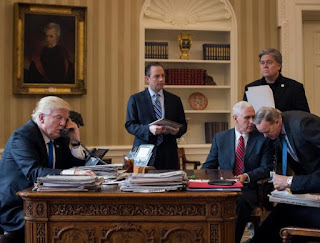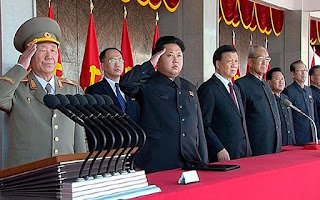The Law of Unintended Consequences in Statecraft
The Law
of Unintended Consequences in Statecraft
By E. Stanley Ukeni
As the world breathe a
collective sigh of relieve over the current de-escalation of the last weekend’s
crisis in the Korean Peninsula—with the failure of the North Korean
administration to conduct, what the United States’ administration would have considered,
a provocative underground nuclear test sometime during the weekend celebrations
marking the 105th birthday of the founding leader of North Korea,
Kim Il Sung, the grandfather of the current ruler of the hermit kingdom, Kim
Jong Un.
It should be recalled that in
the face of North Korean leadership’s persistent bellicose rhetoric and saber-rattling,
the U.S. military purportedly dispatched a formidable aircraft carrier battle
group to the Western Pacific Ocean—just off the Korean Peninsula. This was soon
followed with statement by U.S. President Donald Trump that, “North Korea is a problem…” The U.S.
President further issued a cryptic warned that, “The problem will be taken care of”.
It was widely believed that if
the belligerent North Korean government had undertaken a nuclear test on April
15th 2017, as anticipated by U.S, intelligence analysts, the Trump
administration would have responded militarily against the North Korean regime.
Thankfully, a dreadful military confrontation between North Korea and the
United States did not occur, as many feared.
However, as tensions between
the two countries remain dangerously high—with an even more belligerent North
Korean, led by an unpredictable Kim Jong Un, who views the new U.S. President
as an existential threat to his administration, I feel it necessary to
highlight the potential effects of the Law of Unintended Consequences in
Statecraft.
I would hope that policymakers
and security threat analysts are have factored this important variable into any
future calculus in dealing with further North Korean provocations. And trust
me, there will be further provocations—even escalation, from the North Korean
regime.
I define the law of unintended
consequences, as applied to this discuss, as a causal effect of political or
military strategies, and policies, employed by a government, which has the
potential of causing an unanticipated and unintended collateral effect.
Frequently, this superfluous
effect of an intended action may have been foreseen and thus factored into the
calculus of the principal-initiator and so may have beneficial or neutral
impact. But as sometimes the case, the unforeseen effect of this law is
negative—one that makes the original problem worse.
The law of unintended
consequences is an ever looming phenomenon because of the propensity for even
the most thoroughly gamed-out political maneuvering and plan or military
strategies to be susceptible to its effect. Even with the best intelligence
analysis on the capabilities of an opponent, this law still manages to surprise
even the most tactical strategists.
Case in point, the strategic
decision by the U.S. leadership to threaten the North Korean regime with a
military strike, if they conducted an underground nuclear test, was probably
predicated on the believe that the U.S. intelligence agencies had a high degree
of confidence that—based on their knowledge of the level technical progress of
the North Korean ballistic missiles, that the ubiquitous U.S. missile defense
systems would reliably shot down all know intercontinental ballistic missile in
the North Korean arsenal that could threaten the American homeland.
Imagine the surprise of
bewildered defense analysts to learn, during the military parade on Saturday, April
15, 2017, that the North Korean military does possess in its arsenal two
previously unknown types of solid-fuel intercontinental ballistic
missiles—albeit concealed inside canisters.
Now consider a scenario where the
decision to militarily engage the North Korean military is based on a flawed
notion that Pyongyang does not possess a viable retaliatory capability only to
learn, after the shooting war starts, the North Koreans has indeed achieved the
technical capability to produce and deploy ultra-long-range solid-fuel missiles.
During my research for this
article, I came across a telling quote by Ankit Panda in The Diplomat. He
writes, “We don’t know what, if anything,
was inside the canisters since North Korea hasn’t publicly shown off or tested
any missile of that size before….”
He continues, “We can infer given the size of the canister
and the fact that it was paraded on Saturday that Pyongyang wants the world to
know that it is actively working towards at least two types of solid-fuel,
canisterized ICBMs”.
The point of this article is
not to deliberation whether the canisters were empty or not, or if they are
still working on a prototype missile. The point is that no one seemed to know
that this weapon system existed before the North Koreans revealed it.
So, for the sake of argument,
what if the North Koreans have—say for the past two years, secretly deployed
these two types of solid-fuel ICBMs in their arsenal and no one knew about it.
Another intriguing question should be, ‘what other menacing advance weaponry could
the North Korean be hiding deep in their underground bunkers?’ These questions
are important because the law of unintended consequences often rears its ugly
head amidst the unknown. Surprises can be very costly.
I should add here that there is
no doubt in my mind that in an undesirable scenario a military conflict were to
erupt between the United States and its regional allies and North Korea, the
Korean People’s Army could not, by any stretch of the imagination, win a
sustained war against the formidable U.S. Armed Forces. However, the law of
unintended consequences does dictate that the North Korean’s could do a lot of
damage, perhaps to the American homeland, before they could be stop.
In my humble opinion military
confrontation may not a viable means of containing the North Korean military
threat, at least for now. This challenge is one that could be managed
diplomatically—preferably with the corporation of the Chinese government.
It is heartening to note that the
United States Vice President, Mike Pence, told U.S. servicemen aboard the
Aircraft Carrier, USS Ronald Reagan, in Japan on Wednesday, April 19th
2017, that, “The United States of America
will always seek peace, but under President Trump, the shield stands guard and
the sword stands ready.” I’m pretty confident that the Trump administration
is well versed in the arcane art of Statecraft. They may on occasions employ
unorthodox, and perhaps even bewildering, strategy in achieving a desirable
outcome, but their process seems to be effective.
The next time the North
Koreans, or any other despotic country for that matter, engages in yet another ‘attention
grabbing antics, it is well to keep in mind that the menace of the law of unintended
consequences will be looming large over whatever decision is taken to contain
the crisis.
Political strategists and war
planners must factor the spectre of this unknown and un-quantifiable variable in
their calculus. It is worth noting also that the specter of other, game
changing State and non-State actors, entering the fray is one that I think must
keep every analysts awake at nights.
Authored by E. Stanley Ukeni, ©
2017. All Rights Reserved. This material and other articles or stories posted
on this blog site may not be reproduced, published, broadcast, rewritten or
redistributed, in whole or in part, without prior expressed written permission
from the author, E. Stanley Ukeni.
You are invited to follow E.
Stanley Ukeni on twitter at; @EzStan . You’re equally invited to follow him on
google+. Oh yeah, don’t forget to subscribe to this blog Site. Thanks.






Comments
Post a Comment